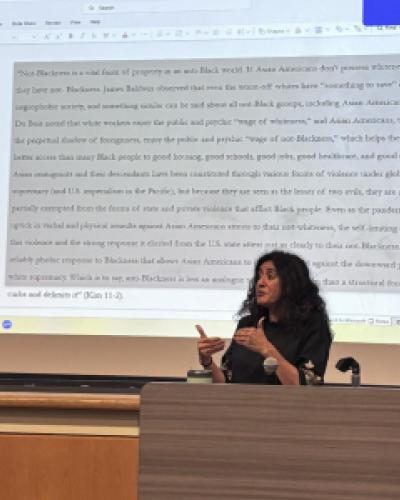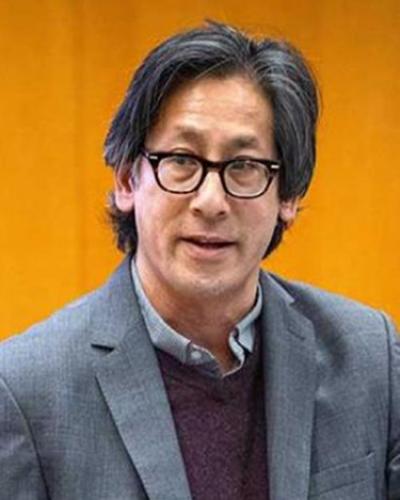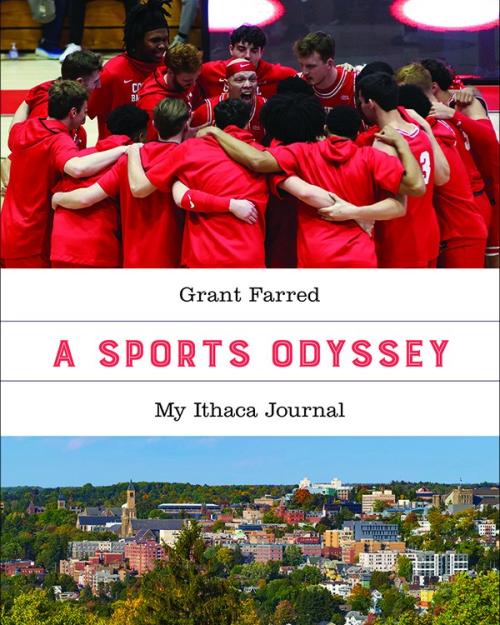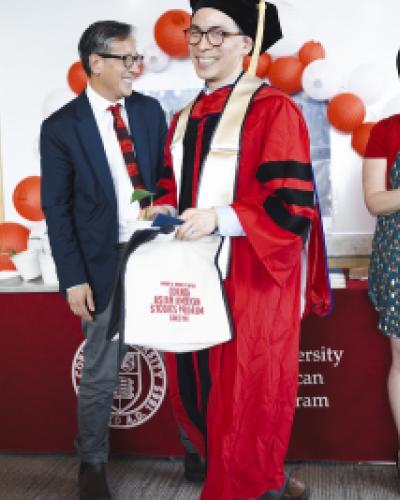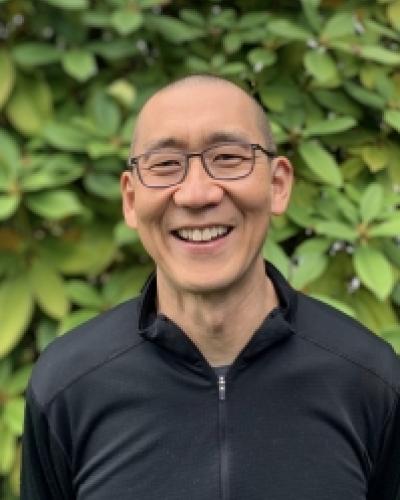"I tell my students: “once you see empire, you can't unsee it.” And I think it's literally everywhere...It is really the defining feature of the United States.”
Currently a professor of history at the University of Washington, Moon-Ho Jung '91, government, MA '95, Ph.D. '00, history, returned to Cornell University to give a talk on his book, Menace to Empire: Anticolonial Solidarities and the Transpacific Origins of the US Security State on April 26, 2022 at 4:30 p.m., hosted by the Asian American Studies Program. As a follow-up, Sarah Meiners, PhD student in history, and Priyanka Sen, PhD student in history of architecture and urban development, interviewed Professor Jung to talk about his book and future work.
This transcript has been edited for clarity and content.
Priyanka: The first question that we really wanted some context on is: what are the origins of Menace to Empire, and how does it build off your previous work?
Professor Jung: I thought of the project many, many years ago, before I even finished my first book. I started teaching a lot of courses in U.S. history, and I just could not make sense of why U.S. immigration laws targeted radicals and Asians at the same time during the first three decades of the twentieth century. I mean, they're so focused, right? Immigration laws really targeted those two groups, and I just had a hunch that there had to be some kind of a connection.
If you read the literature, though, they fall into completely disparate categories: radicals on the one hand, often presumed to be European immigrants, and Asians on the other. So that's how the project began. I also started doing the research during the beginnings of the U.S. War on Terror (or so-called U.S. War on Terror). And people started using that term, the U.S. empire, again—by right-wing nuts who embraced it. The second Bush Administration basically claimed the right to detain or kill really anybody living on planet Earth. And it was just so enraging, right, to witness that.
I guess the book came about from a constellation of forces. It began with a question, but then there was a very particular historical context that gave me even more motivation to pursue the subject.
To get back to the original point, I began to realize that there were all these Asian radicals that we don't know about, and what made them radical was that they were deeply anticolonial. That's what made them, you know, radical in the eyes of the U.S. state.
And so, the two targets, radicals and Asians, for me, came together, and what bound them together was not only that they were racialized in particular ways, but they were radicalized to be anticolonial.
"I tell my students: “once you see empire, you can't unsee it.” And I think it's literally everywhere...It is really the defining feature of the United States.”
Sarah: I would say that just as a future U.S. immigration historian, or immigration historian in general, I really appreciate your work for the way that it kind of disrupts the schism, as you said, between this literature on radicalism and anti-Asian immigration legislation at the turn of the century. I especially appreciated the bits in your introduction where you talk about the so-called “nation of immigrants” myth and sort of what your work does to further destabilize both the idea of the nation and of the immigrant, which is something that I want to engage in my own work.
Thinking about topics under immigration history, citizenship is a throughline through that literature and also through your book. So, the second question we had is also based off of your lecture, so it combines both of these topics. In that lecture, you had framed citizenship, you said “not as a solution or a salvation because it's actually the problem,” and it's a problem because it “perpetuates racial hierarchies.” Priyanka and I are wondering if you could talk further about that, especially for people who couldn’t go to your lecture, and then also talk about how it’s a problem and perpetuating these hierarchies in relation to labor and capital.
Professor Jung: One of the main objectives of the book is to provide a critique of liberalism as it has been thought about—practiced—especially in the U.S. context. So, what I meant by citizenship as the problem: you just have to go back to the origins, for example, the 1790 Naturalization Act that limited naturalized citizenship to free, white persons. You just read that, and you can see the racialized, racist origins of the conception of U.S. citizenship in particular. I think the standard narrative that we are accustomed to hearing over and over is that the United States, or the U.S. government, has attempted to include more and more people. Those racial barriers have been removed, so that now everybody is eligible. So, it's the idea of working toward a more perfect union. That really is at the root of these myths about the U.S. nation-state.
But if you step back just for a second, you can begin to see the entire notion of how certain people are deserving and deserve protection by the state, whereas other people are not deserving and deserve to be targets of state violence. That racial logic is so embedded in the idea of citizenship that I don't think you can ever disaggregate the two. And so, for me, if you step back just for a moment and just think about the idea of citizenship, it's that who your parents are, or where you are born, will determine what rights you have.
That is such a flawed and ridiculous concept if you think about it. Then, if you explore the racialized origins of those ideas, then it gets even messier. And so, for me, we need to disentangle the overlapping logics of citizenship. And especially for people who are undocumented, I realize that those papers mean a lot. They are powerful documents, and so it's not so much that I'm so removed from the real world that I'm saying that we don't need immigration reforms. We do. But I think as we demand greater access, we need to recognize at the same time that, ultimately, citizenship is the problem: the idea that some people are deserving and others are not.
I would say that's inherent to liberalism, and I think liberal philosophy does the work of masking that deeper logic. It's presented as universal when it's really parochial.
Priyanka: I think that makes a lot of sense, and I think one other theme that runs throughout the book that I find particularly interesting is thinking about these pan-ethnic solidarities that come out of—not necessarily a binary—but the way in which they're sort of presented as radicals versus non[-radicals]. So, throughout the text, there’s a conflict with empire that you’re talking about. So, a question Sarah and I been thinking about as historians is in relationship to the current context today. What are some contemporary ways of rereading these types of historical alliances in a more present situation?
Professor Jung: One thing that I tried to do in the book is to really rethink the deeper roots of the pan-Asian idea because I think we tend to associate it with the Asian American Movement, with the strikes at San Francisco State, with the Third World Liberation Front, and with the movement against the Vietnam War. I think that that history is definitely there, but it seems to me that we need to figure out where the deeper origins are, especially before World War II. It was really anticolonialism that bound different Asian peoples together, a way for them to imagine political solidarities with one another. It was somewhat through anarchism but really through the communist movement that I think you can really begin to see the potential of pan-Asian solidarity.
But I do think these kinds of political solidarities, political imaginings, potential alliances are always going to be historically rooted. So, for me, pan-Asianism as an anticolonial impetus was possible and radical for a time. But, once that idea began to be appropriated, in particular by the Japanese state, and once the communist movement turned to the Popular Front rhetoric, I think that radicalism disappeared. I think it ceased to be possible.
So, what does that all mean for today? I don't know. I just know that it's not as if just because people thought of pan-Asianism or pan-Asian anticolonialism as a radical possibility in the 1920s and 1930s doesn't mean that it's the answer for now. Is there a potential, in terms of combating the resurgence of anti-Asian violence? Perhaps. I don't know. But I think it's worth thinking about, and I think it always has to be organic. I think it has to meet the particular demands of the moment. I don't know if we can apply the past to the present. I don't think we can, but I think we can use the past to think creatively. And just the fact that there were all these people scattered across the Pacific, thinking about the same thing, thinking about the U.S. empire, the British empire, the Japanese empire—I think that's really powerful. Just to know that history
Sarah: I think the power of knowing the history, this might be incorrect, but seems like it's connected, thinking as a historian, to your engagement with [Lisa] Lowe’s concept of the “past conditional temporality,” which you discuss in your introduction. It seems like that purpose really comes through as the value of thinking about these historical connections.
You stated [in your lecture] that “once you see empire in terms of both the verb and the noun, you can't unsee it, and it's everywhere.” I'm thinking about especially the moment these questions are percolating during the so-called War on Terror, all of these the different ways of seeing empire, and the way that people are seeing and using it. And I guess I’m just wondering if you could expand further on what you mean by seeing empire, and then if it's appropriate, how you subvert it—not so much the seeing, but the empire itself. And obviously there's historical examples in your text.
Professor Jung: It’s something that I often say in my classes. I tell my students: “once you see empire, you can't unsee it.” And I think it's literally everywhere. It's in the Pacific Northwest. It's in upstate New York. It's in California. It's not just in places like Puerto Rico or Guam. It is really the defining feature of the United States. So, it goes back to your earlier point about my trying to disrupt this “nation of immigrants” narrative. Really a major premise of the book is that the United States is fundamentally, first and foremost, an empire rooted in white supremacy. So, if that is the starting point, rather than a “nation of immigrants,” then you begin to see everything differently. All the laws, all of the myths that are meant to justify and erase the mass violence, the genocidal violence, committed by the U.S. to date, all of that becomes visible, comes to the fore. And so, we can think about the land all around us differently. I know a lot of people use the land acknowledgement, and I think that’s great if it’s meant to be used as a starting point to begin a radical critique of the United States--not simply just to acknowledge, you know, the lands and peoples as if they disappeared.
I don't know how many U.S. historians teach U.S. history around the theme of empire. I would guess probably not the majority. I just wonder how many—I don't know the answer to this, but I would be curious to know—how many U.S. history survey courses continue to talk about empire after 1898. And that includes concepts like the American West. I understand that there are different takes on the American West, but at the same time to really think about what made the West possible is colonialism. And I think most people recognize that, but how do we really engage and grapple with that so that we can work towards something different. I don't know if that's that prominent in U.S. history at the moment. I don't know how many U.S. historians are willing to engage empire as a central facet of U.S. history. What do you think? As somebody being trained in U.S. history now.
Sarah: My first response to that is, maybe it's not the most practical response, but it’s almost one step further and is something I think you talk about in a footnote in the introduction. If you are discussing empire in U.S. history, if you're teaching U.S. history through empire, which perspective are you taking? And there's a critique of historians of U.S. empire where it’s these places and these people only become relevant once they're placed in dialogue with the United States, the state itself. And so, if we think about continuing the discussion of settler colonialism and other iterations of empire after 1898, how do we do that without further centering the United States, the state, the white supremacist monolith. And so, speaking as someone who does discuss the United States’ territories—first of all the “United States territories” we can problematize that term—I engage in this question and the idea of teaching empire throughout the twentieth century. But I also don’t have an answer for how many people are actually doing it and how often it's done, if it’s just the Philippines in 1898—which is obviously incredibly important—but it’s also not just 1898.
Priyanka: That's what I was going to say. I think it's such expanse that when you actually start to really dig into it and you're not just presenting it as a fact, but rather doing it as a critique, that's where the challenge of teaching it, to some extent, becomes really challenging because you're suggesting empire is everywhere. Once you start to really dig into that, even if it's just in the United States, the way in which that becomes an unlayered unpacking that you have to force yourself to do, I think is an enormous challenge...And so, it's an interesting move to start to really think about that as an interdisciplinary study, which is what I'm interested in doing- thinking about empire, not only as a history, but also as a spatial history. And unpacking how that becomes so much a part of this narrative of the myth of the “nation of immigrants.” And so, I think that there's so much there to just continually unpack. In some part, those of us who are doing the work right now as students are learning how to think about it in this way really is a huge step towards hopefully having more history classes that look at it that way.
Professor Jung: I appreciate that. I think that's always been there, and I guess I'm just finding it frustrating the degree to which we have to have the same debate—is the United States an empire or not?—which is just such a messed-up question. That is not the place to begin. Of course, it is. And so, how do we denaturalize, for example, let's say California. Why do we assume that that is a part of the United States? I think people are a little bit more careful about places like Hawai‘i, but it really is what, you know, Lisa Lowe talks about in terms of how thinking about other possibilities, rather than this teleological incorporation by the United States. How can we think of other possibilities, other kinds of senses of belonging, collective belonging, other kinds of solidarities. I feel like I've been picking on the field of U.S. history, but I would say even presumably insurgent, radical, interdisciplinary fields like Asian American Studies are also complicit. I think a lot of the ideas that have come out of Asian American Studies over the last three decades have completely fallen into that liberal narrative of “nation of immigrants.”
Sarah: It might be in a footnote, there’s a critique of the historiography, of the emphasis towards the liberal progression towards multiculturalism, which I think connects back to your critique of citizenship as a step by step, this state being like “Okay, you can also have citizenship,” and it's just incredibly problematic.
Professor Jung: Right. And that history, that historical narrative, tends to present the Chinese Exclusion Act, the incarceration of Japanese Americans, as somehow these aberrant acts, somehow exceptional acts in U.S. history. But how can you study U.S. history seriously and really think that Chinese exclusion was somehow exceptional or that the incarceration of Japanese Americans was? It’s just maddening, but maybe I'm alone in feeling so frustrated.
Sarah: No, I don't think you are.
Professor Jung: But I would say that once you—and I'm not saying I have all the answers; by no means do I have all the answers—but I think once you begin to ask these kinds of questions very honestly, very critically, I think most people get it. Students definitely get it. And then things start to make sense and then you can dig deeper, to ask deeper questions.
But you know, just building off of that, just mentioning the incarceration of Japanese Americans gets me thinking: how do we think about, how do we present, how do we frame World War II? Because at least in U.S. historiography, I think it's still seen as the “good war,” to a great extent. I think a lot of people will acknowledge some of the mistakes that were made. But what I would suggest—and I think I gestured toward this at the end of the book—is that we should really think about World War II as an inter-imperial war. And then if you do, even Pearl Harbor begins to look different. Japanese forces not only attacked Hawai‘i, but attacked the Philippines, British colonies in Southeast Asia, French colonies. So, it begins to look very different once you begin to look at it through the lens of empire. And then—and by no means am I justifying the incarceration of Japanese Americans—but even that begins to look different if you look at World War II as an inter-imperial war. That the U.S. state demanded that Japanese Americans pledge, to profess their loyalty to the United States. That's a very colonial act, to demand loyalty. And the Japanese state did the same thing in the Pacific. They demanded loyalty from the people that they were trying to claim unilateral sovereignty over, which to me is empire.
So, I haven't really studied World War II at length, but for me, when I took U.S. history classes in high school or in college, that imperial context was definitely not in the foreground. You know what the standard narrative is. Japanese forces attacked Pearl Harbor. It was a sneak attack and then there was wartime hysteria. The U.S. government decided to incarcerate Japanese Americans along the West Coast, but then later realized that it was a mistake and apologized and gave reparations. That's sort of the standard narrative around Japanese Americans, but there's so much more...
Sarah: But doesn’t the law—or the Supreme Court’s decision—still stand, though?
Professor Jung: Oh yeah, yeah.
Sarah: They didn’t fundamentally alter—
Professor Jung: The authority of internment.
Sarah: ...the power to incarcerate people.
Professor Jung: Internment is still there, and, in fact, it expanded dramatically during the so-called War on Terror.
Sarah: We wanted to talk about some loose questions: where you might go from here based on teaching, or different writing you might be doing, or sort of what other work you've been engaging with, both in the historical literature, but then also in pop culture that you might be excited about.
Professor Jung: If I could just say something to end on a hopeful note because I think we've been talking about very depressing things. I think we live in a very depressing world, so I think we need to be talking about the mass violence committed by the U.S. empire not only historically, but ongoing. I think that just has to be something that we talk about. We can't just make it invisible, hoping that somehow that makes everything better. So, I'm talking about it constantly. And I realize that's not an uplifting topic, but I think it's something that we need to confront, contend with, but at the same time I think one of the things that I tried to do in the book is to really stress that there were people grappling with those forces. And they were asking questions. They were constantly looking for something better. Did they have all the solutions? No. But they were there to ask questions, to critique. And really, ultimately, the book is about how the U.S. empire’s claiming security, national security, is fundamentally about imperial insecurities. And so as powerful, as violent, as the U.S. state is, I think it ultimately rests on insecurities that really point to the fragility of that formation of the U.S. empire. And hopefully that message comes across in the book. I think it's a hopeful note. Even though I realize much of it is very depressing.
I will continue to think about U.S. history, to really think through what it means to be thinking about empire as a critique, as you put it, Priyanka. One of the things that I very consciously tried to do in the book is not to reproduce these concepts that we're so used to like continental expansion versus overseas expansion because what does that mean anyway? Because the West Coast could not have been more overseas in the nineteenth century if you think about it. And so that seems like a faulty concept. I think settler colonialism as a critique, as a concept, has been very helpful, but at the same time I'm trying to think through what that means in terms of the U.S. empire because I think it can also reinforce concepts like continental versus overseas. So just to think about the U.S. empire differently is what's motivating me at the moment, both in the classroom and in my writing. And the next book project is going to be, I think, a synthesis of Asian American history, rooted in empire as opposed to the liberal nation.

